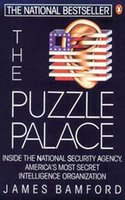 That's what today's Seattle Post-Intelligencer is saying:
That's what today's Seattle Post-Intelligencer is saying:A review of Justice Department reports to Congress shows that the 26-year-old Foreign Intelligence Surveillance Court modified more wiretap requests from the Bush administration than from the four previous presidential administrations combined.Why would the FISA court block more requests from an administration battling post 9/11 terrorism?
The story continues:
To win a court-approved wiretap, the government must show "probable cause" that the target of the surveillance is a member of a foreign terrorist organization or foreign power and is engaged in activities that "may" involve a violation of criminal law.Let's paint a scenario that AQ was involved in the Anthrax letter attacks. Bush would have been worried that more attacks were coming and the trigger was clearly within the USA. Bin Laden would also probably use 'lilly-whites' or other sleepers with no criminal histories, therefore it might be next to impossible to get a warrant to eavesdrop. Now, take that scenario and plug in "nukes" in place of anthrax and you might get the feel of a president's dilemma.
Faced with that standard, Bamford said, the Bush administration had difficulty obtaining FISA court-approved wiretaps on dozens of people within the United States who were communicating with targeted al-Qaida suspects inside the United States.
But since 2001, the judges have modified 179 of the 5,645 requests for court-ordered surveillance by the Bush administration. A total of 173 of those court-ordered "substantive modifications" took place in 2003 and 2004 -- the most recent years for which public records are available.2003 is interesting since it was the year we invaded Iraq. Wonder which domestic persons they wanted to listen to, and wonder what they expected to hear? Saddam was not involved with AQ terrorism, so we've been told.
Certain righty political commentators, and you know who I'm talking about, think both the leaks and the FISA court judge's resignation were timed to help the democrats fight the upcoming confirmation battle on Samuel Alito. It is rather strange we subsequently got a story about Mr. Alito's thoughts regarding this subject when he worked for Reagan. I'm sure you'd all be shocked, shocked, if these stories were timed. I know I would.
A more serious question is whether the Bush administration, already rumored to be at war with the State Department and CIA, is also at war with the NSA. The source of this column, James Bamford, was the author of the book "The Puzzle Palace" and is not a part of the intelligence community. He provides a cryptic comment about how some at the NSA might feel about our current direction:
"NSA prides itself on learning the lessons of the 1970s and obeying the legal restrictions imposed by FISA," Bamford said. "Now it looks like we're going back to the bad old days again."I'm not sure Bamford is being used as a mouthpiece for the NSA the same way Woodward was for Bush, but it's an interesting question.
But I find it amazing these leakers, all very intelligent people, apparently believe America is sufficiently out of danger enough to spill the beans about our counter-terror tactics. Surely they know better, which suggests the enemy they really fear is not overseas or in some American Mosque, rather it's the man occupying the big white house at 1600 Pennsylvania Avenue.

No comments:
Post a Comment